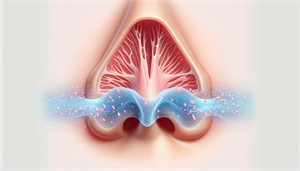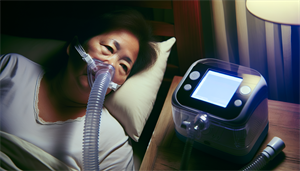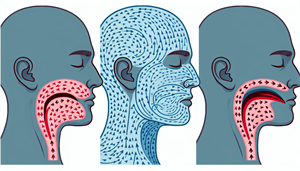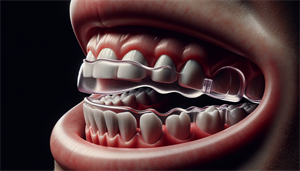Snoring - we’ve all encountered it in some form or another. But did you know that not all snoring is the same? In fact, the sounds emanating from our noses and mouths as we slumber can be quite telling.
One particular type, nasal snoring, can not only be a nuisance but also a sign of underlying health issues. Intrigued? Let’s explore this noisy nocturnal phenomenon together, and answer the question: can you snore through your nose?
In this journey into the world of nasal snoring, we’ll delve into its causes, symptoms, and its connection to a serious sleep disorder - sleep apnea. We’ll guide you on figuring out if you’re a nose snorer and arm you with strategies to combat it.
Key Takeaways
-
Nasal snoring is caused by airway obstruction resulting from structural issues, inflammatory conditions, or allergies, and can lead to vibrations in the nasal tissues similar to an obstructed wind instrument.
-
Nasal snoring is closely connected to sleep apnea, a disorder that involves breathing interruptions during sleep, and can arise from abnormalities in nasal or pharyngeal structures.
-
Various strategies to combat nasal snoring include lifestyle changes, home remedies like nasal strips and humidifiers, and medical treatments such as surgical interventions, oral appliances, or CPAP therapy.
Nasal Snoring Explained

Nasal snoring is more than just a nighttime nuisance. It’s the result of airway obstruction, leading to vibrations in the nasal tissues. Imagine a wind instrument, like a saxophone. When the airway or ‘windpipe’ is clear, air flows smoothly, creating a pleasant sound. But what if there’s an obstruction? The instrument produces an entirely different, often unpleasant sound, similar to snoring.
This bothersome symphony can be orchestrated by:
-
Structural issues such as a deviated septum
-
Inflammatory conditions that lead to nasal obstruction
-
Nasal polyps or pet and dust allergies that induce congestion and obstruct the nasal airway.
Causes of Nasal Snoring
A stuffy nose, breathing difficulties, and irregular snoring sounds are the telltale signs of nasal snoring. But what causes this type of snoring? Just like a traffic jam can be caused by roadworks or an accident, nasal snoring can be attributed to various factors.
Common culprits of snoring include:
-
Allergies, which can lead to nasal congestion, sneezing, and a runny nose
-
A simple cold, which can cause nasal congestion or narrowing, leading to an increase in the probability and volume of snoring
-
Anatomical issues, such as a deviated septum, which can obstruct the airflow through the nasal passages
These factors can all contribute to why snoring occurs during sleep.
Symptoms of Nasal Snoring
Recognizing the symptoms of nasal snoring is the first step towards managing it effectively. But, what signs should you be on the lookout for? Typically, nasal snoring can be accompanied by symptoms such as witnessed breathing pauses during sleep, excessive daytime sleepiness, difficulty concentrating, morning headaches, and a sore throat upon waking up. Chronic nasal snoring can present indicators like blocked or misshapen sinus cavities, quiet vibrations, and sinus inflammation.
Nasal snoring resulting from sinusitis may include a sensation of inadequate sleep and worsening of snoring when throat muscles relax. Not to mention, congestion from sinus problems or a stuffy nose can contribute to nasal snoring symptoms.
The Connection Between Nasal Snoring and Sleep Apnea

Having covered the causes and symptoms of nasal snoring, we must also consider its potential link to a serious sleep disorder - sleep apnea. This disorder, characterized by breathing interruptions and choking episodes during sleep, can have serious health implications if left untreated.
The connection between nasal snoring and obstructive sleep apnea is primarily due to nasal and pharyngeal abnormalities, which can cause narrowed airways and increase the risk of apneas. Nasal snoring can potentially contribute to the development of sleep apnea by inducing nasal obstruction, leading to the collapse of the airway during sleep. In fact, studies indicate that up to 86.8% of habitual nasal snorers may suffer from sleep apnea.
The impact of sleep apnea on sleep quality and overall health is substantial, contributing to conditions such as obesity and insomnia, along with daytime fatigue and sleepiness.
Obstructive Sleep Apnea
Before discussing when to seek medical help, it’s worthwhile to understand obstructive sleep apnea – the most prevalent form of sleep apnea, characterized by loud snoring, gasping for air, and moments when individuals briefly stop breathing.
This condition is attributed to various factors that impede airflow through the upper airways during sleep, including obesity, enlarged tonsils, hormonal fluctuations, and specific anatomical characteristics of the head and neck. Diagnosis involves overnight monitoring of heart, lung, and brain activity, as well as breathing patterns during sleep testing at a sleep center.
When to Seek Medical Help
Recognizing the right time to seek medical help is vital for managing nasal snoring and its potential link to sleep apnea. But when exactly should you consider reaching out for medical assistance?
You should consider seeking medical assistance if you experience excessive daytime sleepiness, loud snoring, or choking during sleep. It’s crucial due to the potential serious health consequences associated with snoring. An ENT specialist would likely recommend tests to diagnose the underlying cause of your symptoms and provide the most suitable treatment if deemed necessary.
Strategies for Reducing Nasal Snoring
Snoring doesn’t have to be a permanent part of your life or your partner’s. There are several strategies available, from lifestyle changes to medical treatments, to help you combat nasal snoring.
Depending on the root cause of your snoring, different strategies may prove effective. For some, a change in diet or sleeping position may alleviate their symptoms. Others may find that certain foods exacerbate their snoring, such as:
-
Dairy products
-
Bananas
-
Potatoes
-
Corn
-
Cabbage
-
Fatty or high-protein meats
Lifestyle Changes
Before exploring medical treatments, consider making some lifestyle changes. They can be as simple as maintaining a healthy weight, avoiding alcohol, and sleeping on your side.
Maintaining a healthy weight can help reduce nasal snoring and even reduce snoring overall by shedding excess fat and decreasing tissue in the throat. Abstaining from alcohol is advisable because it relaxes the throat muscles, leading to increased airway obstruction during sleep. And sleeping on your side can reduce the effect of gravity on the throat, helping keep airways open.
Home Remedies

If you’re looking for ways to manage nasal snoring at home, there are several remedies you could consider. Nasal strips, saline nasal spray, and humidifiers can be effective in reducing nasal snoring.
Some products that can help with nasal snoring and enhance sleep quality include:
-
Nasal strips, which have demonstrated effectiveness in reducing nasal snoring
-
Saline nasal spray, which aids in disrupting surplus mucus, hydrating the nasal passages, and diminishing irritation and inflammation
-
Humidifiers, which can moisturize the nasal cavities and throat, alleviating dryness and irritation resulting from inhaling dry air. The type of humidifier, whether a cool mist or warm mist, can be chosen based on personal preference.
Medical Treatments
While lifestyle changes and home remedies can significantly reduce nasal snoring, some cases may require medical treatment, especially when blocked nasal passages are involved. Treatments can range from surgical interventions, oral appliances, to continuous positive airway pressure (CPAP) therapy.
Surgical options for treating sleep apnea include:
-
The pillar procedure (palatal implants)
-
Uvulectomy
-
Nasal reconstruction
-
Adenotonsillectomy
-
Somnoplasty
Oral appliance therapy has been shown to decrease sleep apneas, snoring, and symptoms of restless legs by modifying the position of the jaw and tongue during sleep. On the other hand, CPAP therapy addresses nasal snoring through maintaining positive airway pressure, which reduces the vibration that produces the snoring sound and aids in relieving nasal swelling and clearing mucus from the nasal passages.
How to Determine if You're a Nose Snorer

With all this information, you might be wondering: “Am I a nose snorer?” Understanding your specific type of snoring can aid in choosing the most effective treatment strategy.
Snoring can be classified into four categories:
-
Nose snoring: primarily linked to obstructions in the nasal airways
-
Mouth snoring: associated with blockages in the oral airways
-
Tongue snoring: caused by the tongue blocking the airway
-
Throat snoring: caused by the relaxation of the throat muscles
Each type can have different causes and remedies. Distinguishing between these types can be achieved by comparing the symptoms associated with each type of snoring.
Nose Snorer Characteristics
So, how do you know if you’re a nose snorer? There are certain characteristics that you can look out for.
If you commonly experience symptoms such as a congested nose and challenges with breathing, you might be a nose snorer. Physical characteristics such as:
-
micrognathia
-
retrognathia
-
a short and thick neck
-
abnormal positioning of the nose
Nose snorers, who typically engage in nasal breathing while sleeping, often face difficulties such as a stuffy nose or obstructions in their nasal airways. This is in contrast to mouth breathing, which is observed in individuals who snore through their nose.
Mouth Snorer and Throat Snorer Comparison
Understanding the differences between mouth snorers and throat snorers can provide you with a more comprehensive understanding of your specific type of snoring.
Throat snoring is a condition caused by sleep apnea, characterized by loud snoring and gasping for air. In contrast, mouth snoring results from obstruction in the nasal passages or mouth, leading to the vibration of tissues and the production of a hoarse or harsh sound. The key here is to understand your symptoms and consult a sleep specialist for a proper diagnosis.
The Importance of Proper Diagnosis and Treatment
Acknowledging the significance of accurate diagnosis and treatment is vital for managing nasal snoring. Nasal snoring might seem like a mere annoyance, but it can lead to serious health consequences if left unchecked. Seeking the right diagnosis and treatment holds great importance in preventing potential health risks and enhancing overall well-being.
A sleep apnea test, known as a polysomnogram (PSG), could be conducted to assess symptoms. If left untreated, obstructive sleep apnea can result in various complications, including:
-
diabetes
-
stroke
-
high blood pressure
-
heart failure
-
obesity
-
arrhythmias
-
cardiomyopathy
These conditions can significantly impact overall health and well-being. Snoring might also serve as an early indicator of cardiovascular disease.
Consult with a Sleep Specialist
If you think you might be a nose snorer, consulting a sleep specialist would be beneficial. They can help pinpoint the cause of the snoring and devise a suitable treatment plan.
A consultation with a sleep specialist typically involves a brief physical examination, a comprehensive discussion of your medical history and snoring symptoms, and completion of relevant paperwork. They may recommend additional assessments such as a sleep study, depending on their initial observations.
The sleep specialist may suggest a range of treatments such as:
-
Steroid nasal sprays
-
Nasal strips
-
Oral appliances
-
Continuous positive airway pressure (CPAP) therapy
The specific treatment will depend on your condition.
Potential Health Risks
Comprehending the potential health risks connected with untreated nasal snoring is essential. This can serve as a motivator in seeking timely medical help. Untreated snoring can lead to health implications like elevated blood pressure, increased risk of stroke, and susceptibility to diabetes. Addressing the underlying sleep apnea or snoring can help reduce the risk of these conditions.
While certain studies have not established a clear association between untreated snoring and an elevated risk of stroke, sleep disturbances like snoring and apnea have been linked to increased risk for stroke. Research also indicates a positive association between the frequency of snoring and the risk of developing diabetes.
Untreated snoring, particularly in cases of obstructive sleep apnea, can elevate the risk of heart diseases. Those who snore loudly may be experiencing a more severe form of sleep apnea, which requires medical attention.
Summary
Snoring is more than just an interruption to a peaceful night’s sleep. It’s a health concern that requires understanding, proper diagnosis, and effective treatment. From the disruption of the serene sounds of the night to potential serious health implications, nasal snoring is something that shouldn’t be ignored.
So, the next time you or your partner snores, remember – it’s not just about the noise. It’s about understanding the cause, seeking the right help, and finding the most effective solution. After all, everyone deserves a good night’s sleep.
Frequently Asked Questions
Can you still snore through your nose?
Yes, you can still snore through your nose if it is stuffy, blocked, or congested, leading to inefficient breathing.
Is snoring through your nose bad?
Yes, snoring through your nose can be bad, especially if your nasal passages are blocked, which can lead to inefficient breathing. This can be caused by a cold, allergy, or nasal congestion.
What does nasal snoring sound like?
Nasal snoring can sound like a whistle, grunt, or rumble due to the vibration of soft tissues and mucosal wall surfaces in the narrowed nasal passage.
Can you snore without opening your mouth?
Yes, you can snore without opening your mouth due to poor muscle tone in your throat or tongue, which can block the airway even with your mouth closed. This can result in louder snoring compared to when your mouth is open.
What causes nasal snoring?
Nasal snoring is often caused by physical obstructions in the nasal airways, such as a deviated septum, nasal polyps, and allergies that lead to congestion. Avoiding these obstructions can help reduce nasal snoring.


